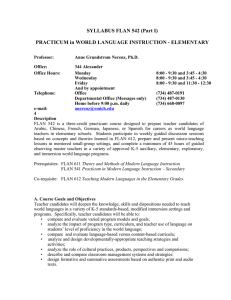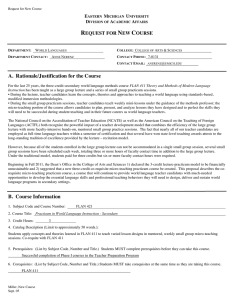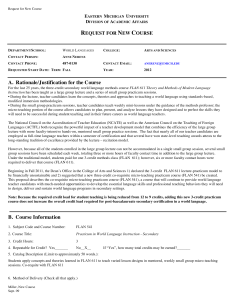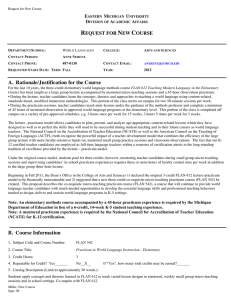SYLLABUS FLAN 541 PRACTICUM in WORLD LANGUAGE INSTRUCTION - SECONDARY Part I
advertisement
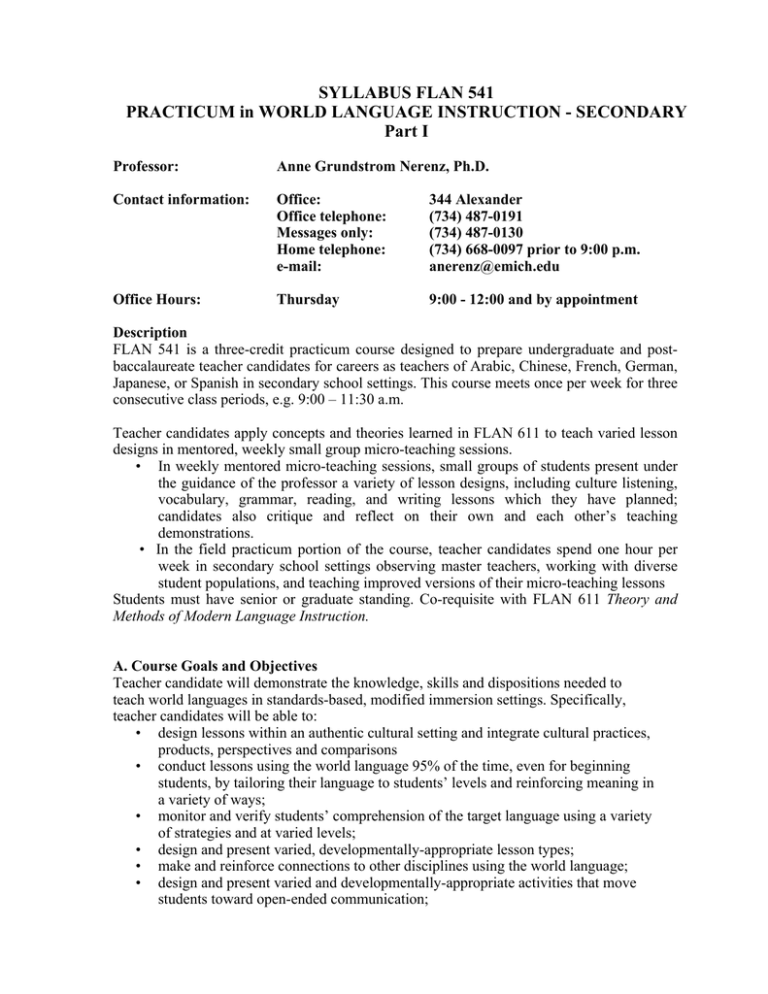
SYLLABUS FLAN 541 PRACTICUM in WORLD LANGUAGE INSTRUCTION - SECONDARY Part I Professor: Anne Grundstrom Nerenz, Ph.D. Contact information: Office: Office telephone: Messages only: Home telephone: e-mail: 344 Alexander (734) 487-0191 (734) 487-0130 (734) 668-0097 prior to 9:00 p.m. anerenz@emich.edu Office Hours: Thursday 9:00 - 12:00 and by appointment Description FLAN 541 is a three-credit practicum course designed to prepare undergraduate and postbaccalaureate teacher candidates for careers as teachers of Arabic, Chinese, French, German, Japanese, or Spanish in secondary school settings. This course meets once per week for three consecutive class periods, e.g. 9:00 – 11:30 a.m. Teacher candidates apply concepts and theories learned in FLAN 611 to teach varied lesson designs in mentored, weekly small group micro-teaching sessions. • In weekly mentored micro-teaching sessions, small groups of students present under the guidance of the professor a variety of lesson designs, including culture listening, vocabulary, grammar, reading, and writing lessons which they have planned; candidates also critique and reflect on their own and each other’s teaching demonstrations. • In the field practicum portion of the course, teacher candidates spend one hour per week in secondary school settings observing master teachers, working with diverse student populations, and teaching improved versions of their micro-teaching lessons Students must have senior or graduate standing. Co-requisite with FLAN 611 Theory and Methods of Modern Language Instruction. A. Course Goals and Objectives Teacher candidate will demonstrate the knowledge, skills and dispositions needed to teach world languages in standards-based, modified immersion settings. Specifically, teacher candidates will be able to: • design lessons within an authentic cultural setting and integrate cultural practices, products, perspectives and comparisons • conduct lessons using the world language 95% of the time, even for beginning students, by tailoring their language to students’ levels and reinforcing meaning in a variety of ways; • monitor and verify students’ comprehension of the target language using a variety of strategies and at varied levels; • design and present varied, developmentally-appropriate lesson types; • make and reinforce connections to other disciplines using the world language; • design and present varied and developmentally-appropriate activities that move students toward open-ended communication; • • design formative and summative assessments based on authentic print and audio texts; and reflect on, analyze, and improve their teaching practice. B. Outline of content to be covered All concepts and skills in this course are cumulative. For example, • in Week 1, the FLAN 611 large group lecture, discussion, demonstration lesson, readings, and written assignments address the teaching of culture and the fundamental role that culture plays both in setting the context for each daily lesson and in unifying lesson activities. In all subsequent weeks, original micro-teaching lessons in FLAN 541: — must be set in an age-appropriate and authentic cultural context and — must address cultural practices, products, perspectives, and distribution and allow language learners to make cultural comparisons. • in Week 2, the FLAN 611 large group lecture, discussion, demonstration lesson, readings, and written assignments focus on making input comprehensible to learners even the most basic levels of proficiency. In all subsequent weeks, original microteaching lessons in FLAN 541: — must be set in an age-appropriate and authentic cultural context; — must address cultural practices, products, perspectives, and distribution and allow language learners to make cultural comparisons; and — must be conducted exclusively in the target language at a level appropriate to novice learners. See the attached course syllabus for a detailed outline of content to be covered. C. Student assignments and presentations Students are expected to: • prepare and present weekly micro-teaching demonstration lessons; • prepare written reflections on weekly micro-teaching demonstrations; • complete at least 15 hours of guided field observation in diverse secondary world language classrooms; • teach five micro-lessons to secondary language learners in diverse world language classrooms; • prepare written analyses and reflections on the five lessons taught to secondary language learners; • prepare and present a mid-term and final teaching demonstration. • prepare a research paper and present key findings on an approved topic. See course syllabus Part II for a detailed list of course assignments. D. Method of evaluation Teacher candidates’ demonstration lessons, written reflections, and in-class peer critiques are evaluated using rubrics. Rubrics are made available to teacher candidates prior to each assignment. Graded course work is weighted as follows: Weekly micro-teaching demonstrations and field demonstration lessons Reflections on weekly micro-teaching demonstrations and practicum lessons Written and in-class oral peer critiques Mid-term teaching demonstration Final teaching demonstration Graduate research paper and presentation 40% 10% 10% 15% 15% 10% E. Grading scale A+ A A- 97-100 93-96 90-92 B+ B B- 87-89 83-86 80-82 C+ C C- 77-79 73-76 70-72 D+ D D- 67-69 63-66 60-62 E 0-59 F. Special Requirements None G. Bibliography and Reading List Teacher’s Handbook 4th Edition Shrum and Glisan Heinle / Cengage, 2010 Standards for Language Learning ACTFL, 2010 Michigan Guidelines for World Language Learning Michigan Department of Education, 2008 Michigan Standards and Benchmarks for World Languages Michigan Department of Education, 2008 FLAN 421 Demonstration Lessons in Chinese, French, German, Japanese and Spanish Nerenz, A.G. A coursepack is also required. H. Other pertinent information: Scheduling FLAN 541 is offered only in the fall of each academic year and is a co-requisite with FLAN 611 Theory and Methods of Modern Language Instruction • Teacher candidates who plan to student teach during the winter semester immediately following this course must have applied for student teaching by June 15, prior to beginning the fall semester in which the course is offered. • Teacher candidates who plan to student teach during the fall semester immediately following this course must have applied for student teaching by January 15. • Teacher candidates seeking K-12 certification must major in the language in which they are seeking certification and successfully complete FLAN 611 Theory and Methods of Modern Language Instruction prior to enrolling in FLAN 612 Methods of Teaching Modern Languages in the Elementary Grades. Course and University Policies LiveText subscription All students seeking teacher certification or endorsement are required: 1) to subscribe to LiveText and 2) submit portions of their work via LiveText; a subscription to LiveText is required for these students. Contact the College of Education to obtain a key code that will allow you to purchase LiveText at a discounted rate. Academic dishonesty Academic dishonesty, including all forms of cheating and/or plagiarism, will not be tolerated in this class. Penalties for an act of academic dishonesty may range from receiving a failing grade for a particular assignment to receiving a failing grade for the entire course. In addition, you may be referred to the Office of Student Judicial Services for discipline that can result in either a suspension or permanent dismissal. The Student Conduct Code contains detailed definitions of what constitutes academic dishonesty, but if you are not sure about whether something you are doing would be considered academic dishonesty, consult with the instructor. Classroom Management Issues Students are expected to abide by the Student Conduct Code and assist in creating an environment that is conducive to learning and protects the rights of all members of the University community. Incivility and disruptive behavior will not be tolerated and may result in a request to leave class and referral to the office of Student Judicial Services (SJS) for discipline. Example of inappropriate classroom conduct include repeatedly arriving late to class, using a cellular phone, or talking while other are speaking. You may access the code online at www.emich.edu/sis Student and Exchange Visitor Statement (SEVIS) The Student Exchange Visitor Information System (SEVIS) requires F and J students report to the Office of International Students, 229 King Hall within 10 days of the event: Changes in your name, local address, major field of study, or source of funding. Changes in your degree-completion date. Changes in your degree level (ex. Bachelors to Masters). Intent to transfer to another school. Prior permission from OIS is needed for the following: Dropping ALL courses as well as carrying or dropping BELOW minimum credit hours. Employment on or off-campus. Registering for more than one ONLINE course per term (F-visa only) Endorsing I-20 or DS-2019 for re-entry into the USA. Failure to report may result in the termination of your SEVIS record and even arrest and deportation. If you have questions or concerns, contact the OIS at 487-3116, not your instructor. Special Needs Accommodations If you wish to be accommodated for your disability, EMU Board of Regents policy #8.3 requires that you first register with the Disability Resource Center, 240 Student Center.. You may contact the Disability Resource Center by telephone at 487-2470. Students with disabilities are encouraged to register with ASO promptly as you will only be accommodated from the date you register with them forward. No retroactive accommodations are possible.
